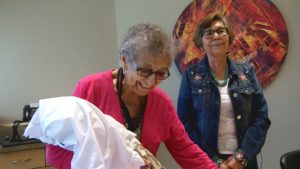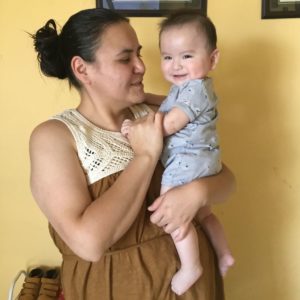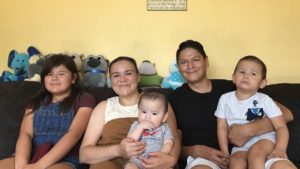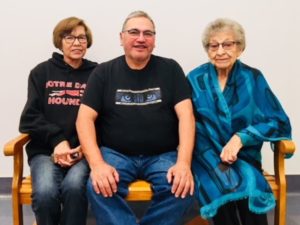Support is an integral part of every successful pregnancy. Yet for some women, especially those who have to travel for appointments, that support isn’t always available.
That’s why the Cree communities of Maskwacis, located 90 kilometres south of Edmonton, teamed up with the University of Alberta (U of A), and Wetaskiwin Primary Care Network to ensure that the women of their communities have support when visiting The Primary Prenatal Clinic.

“Most women from Maskwacis have to travel to Wetaskiwin, Ponoka, or somewhere else for their prenatal care,” says U of A research associate Richard Oster. “There’s a lot of trepidation or fear of going, lots of people may experience discrimination or racism. So one of the things we thought would help was having a smiling Elder in the waiting area to greet them, talk with them, laugh with them, and tells stories, so they feel safer coming into the clinic.”
Originally started as part of ENRICH, a collaborative program aimed at promoting healthy pregnancies among women during pregnancy and postpartum, the Maskwacis Elders Mentoring Program (EMP) brings Elders, called Nohkum or Kokum (meaning grandmother in Cree), to the Wetaskiwin Primary Care Network twice a week when the clinic offers prenatal care.
Having [Lena Cutknife] there, it was a lot better, because at least I knew somebody there who wanted to converse with me. She was always there, wanting to talk. – Mary Jane Saddleback, mother of three
Informal by design, the Elders are there to provide social, emotional, spiritual, and cultural support to mothers and their partners by creating a friendly environment where they can find ease during times of stress.
“She makes us feel welcomed, and even my spouse noticed that the first time he met her,” says Mary Jane Saddleback of Lena Cutknife, one of three Elders who works with EMP. “She’s just always there and she has this warm, welcoming personality so it makes you feel comfortable around her. You don’t feel shy to communicate.”
“When I was there with my second (he’s a toddler now), it was pretty much go in, go out, and I was always worrying if the baby was okay,” shares Saddleback, a mother of three who used the program during her last pregnancy. “But then having [Cutknife] there, it was a lot better, because at least I knew somebody there who wanted to converse with me. She was always there, wanting to talk.”

Those Elders who choose to get involved with the program do so from a place of cultural and emotional strength, wanting to empower the youth of their community, and continue the teachings and ceremonies of their people.
“I thought it was a good opportunity for me to pass on some of the teachings that Elders have taught me over the last 40 years,” says Muriel Lee, an Elder who has been working with the program for about 2.5 years. “I just felt like I could be a source of strength and hope to our young mothers.
“I understand how the spirit travels through the mother to the child, and so, understanding that as well as the moss bag, the belly button ceremony, the swing, understanding all those components and how they impact the growth of the newborn or even the unborn, was the reason I decided to become part of this program,” Lee explains.
According to Lee, during her visits she also has the opportunity to teach staff about Cree culture and how to speak the language, something that helps to further the program’s goal to promote Cree culture even when an Elder is not available.
“Many of our staff have connected with the Elders and appreciate their presence over the years,” says Ariel Veldhuisen, Wetaskiwin Primary Care Network Clinical Manager. “EMP is a valuable resource for us, because we can offer to patients additional support during such an important time for them.”
“It’s not just the physical care that they’re receiving, it’s bigger than that, and broader,” Veldhuisen adds.
Piloted in 2015, expanded in 2016, and with additional expansions that were set to take place both in Wetaskiwin and Ponoka prior to COVID-19, EMP has served as an example of how communities can better support their future mothers and empower themselves at the same time.
“Other communities have heard about our program, and we’ve travelled to some of those places and shared what we’ve done and how we’ve done it,” says Oster, explaining that additional grant money has them looking to do more. “Three other communities have signed on to be a part of our research partnership and are now in that engagement phase of learning how we can bring this program [to them] in an adaptive way, because every community is unique.”

This drive to build programming from the community up is one of the many reasons why EMP continues to grow and find success.
The Elders Mentoring Program stood out for us, because of its impressive community engagement and relationship-building.
– Dr. Greg Powell, Chair of the HQCA Patient and Family Advisory Committee,
It’s also why the program has garnered the attention of organizations such as The Health Quality Council of Alberta (HQCA), a provincial agency that’s mandate is to improve patient safety and health service quality across Alberta,
The HQCA recently recognized EMP with one of four Patient Experience Awards for 2020.
“The Elders Mentoring Program stood out for us, because of its impressive community engagement and relationship-building,” explains Dr. Greg Powell, Chair of the HQCA Patient and Family Advisory Committee, which leads the [Patient Experience Awards] Program and selection process. “The partners in this project truly enabled the Elders and leveraged the community’s desire to take action to improve the care and outcomes for Indigenous women.”
“We were also impressed that the Elders Mentoring Program provides a platform for relationship-building between Elders and clinic staff to enhance cultural sensitivity and improve the overall cultural safety of the clinic,” Dr. Powell adds.
According to Oster, the award encourages their efforts, and helps to show the value of programs that focus on building up the strengths of a community.
“It made us all really happy, gratified, and satisfied. It’s nice that other people think our program is important as well,” he said. “If we’ve benefitted the community, I’ve done my job and I think this is just another step in the right direction to reaching that goal, because we’re getting more positive attention, and people are seeing the value of the program.”
To learn more about the Maskwacis Elders’ Mentoring Program, including how the program is moving forward during the current COVID-19 pandemic, find them on Facebook, or contact the Wetaskiwin Primary Care Network at (780) 312-2500.
– Lesley Allan

